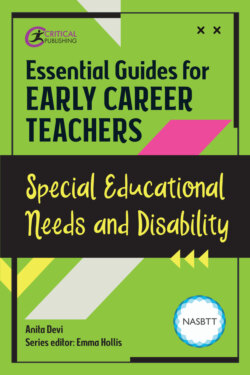Читать книгу Essential Guides for Early Career Teachers: Special Educational Needs and Disability - Anita Devi - Страница 10
На сайте Литреса книга снята с продажи.
ОглавлениеIntroduction
»How much training and information on special educational needs, disability and inclusion should trainees and those new to the profession be given?
This is a much-debated subject with varying answers, from intensive programmes to defining ‘just enough’ in some of the shorter training programmes. My own view has been that trainees and early career teachers need to be given a strong foundation, which they can build upon throughout their career. In effect, we need to establish basic knowledge, skills and understanding so as teachers progress in their careers, they continue to add to and develop their expertise in this area. Many will go on to be leaders and so this training needs to cover both effective classroom practice and the basics of leadership. The field of special educational needs, disability and inclusion continues to evolve from a legislative perspective, and in terms of policy direction and best practice.
In 2017, a team of us with diverse expertise in teacher education and special educational needs started to define what a strong foundation might look like. We combined legal frameworks with research from the field and policy documents to construct 18 key concepts. These concepts were grouped into three themes (Professional Practice, SEND Expertise and Support). For each concept we curated materials and resources that would support providers to improve and develop the quality of their training programmes. This became known as the NASBTT ITT SEND Toolkit. It also included an audit tool for providers to benchmark their provision and define a plan for improvement.
During the month of September, I am regularly invited to talk to trainees and observe them present their research on different aspects of special educational needs and disability (SEND). The presentations, in the main, are of a top quality and it was encouraging to receive a call in 2020 from an NQT provider sharing how they need to change their programme because newly qualified teachers are coming in more skilled and knowledgeable than ever before. This is what we aspire to see.
This book is designed to build on these strong foundations of training and support teachers through the early career framework. The book begins by presenting some fundamentals we would expect all teachers to know in light of the Children and Families Act 2014. However, the book takes teachers further by deepening their knowledge of the four areas of need, cited in Chapter 6 of the 0–25 years SEND Code of Practice 2015. This has been an intentional decision to enhance timely and accurate identification of needs by teachers, as well as to ensure our classrooms are dominated by good practice models of provision. This should lead to children making better progress and developing into adults with a degree of independence.
Throughout my three-decade teaching career, understanding the holistic needs and development of the child has also been a much-debated issue and yet it remains an area we have failed to address successfully, especially in the field of SEND. Too often, connecting the dots is lost in the paperwork! Our focus should be good classroom practice. It is my hope that this book will enable teachers to also think more holistically about the needs of children and young people and their development. We are seeing a greater level of complex needs in schools, with children presenting with more than one need. Teachers need to be knowledgeable and equipped to deal with the increasing level of complexity in the classroom. There are no easy answers, and this is a continuous work in progress. However, the content in this book is intended to take teachers a step further in their careers.
